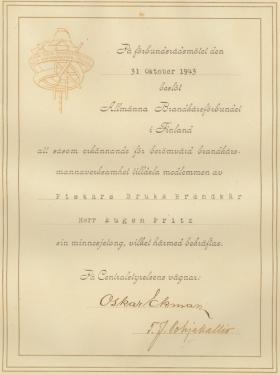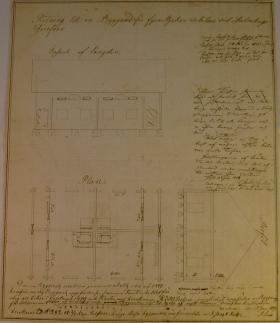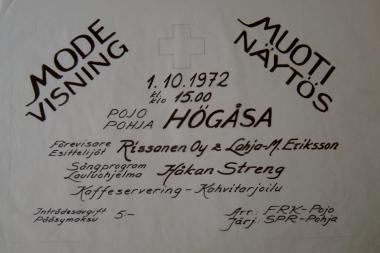Archives
The Pohja Local History Archive functions in collaboration with The Fiskars Historical Archive. The Pohja Local History Archive houses a diversity of archive material, starting from private letters and family records from the 19th century to documentation of modern life. The Fiskars Historical Archive focuses on archive collections concerning the Fiskars corporation, and the different companies that have been part of the Fiskars corporation.
The purpose of the Pohja Local History Archive archive is to collect, organize and preserve material of the history of what used to be the municipality of Pohja. Through outward oriented activity, the archive maintains interest in local history. You do not need any previous experience with archives, and if you are interested in the archive materials you are welcome to contact the archivist!
Korkeavuorenkatu 3, Raasepori, Suomi
Archive Collections
Pohja Local History Archive
The archive collections consist of over a hundred separate archives. These include private and family records, manor records, associations, communities and companies.
The archive database can be found here
Did you find some interesting archival records or photos? Would you like to have copies of them? It is possible to obtain copies of both records and photos. Please note that the copying service in our archive is a chargeable service. All the fees of our archival services are summarized in the price list.
Fiskars Historical Archive
Fiskars Historical Archive is owned by the Fiskars Group, and functions in collaboration with the Pohja Local History Archive. The collections consist of archive materials from the Fiskars iron works and the Fiskars Corporation. Other collections include companies that have been owned by the Fiskars corporation. The archive materials are available for scientific research.
Important Information! Starting from February 2025, it will no longer be possible to visit the archive due to the renovation of the archive building. The archive will therefore be temporarily closed until 2026. Unfortunately, most of the materials will not be available during the renovation. We will respond to information requests with some delay. We apologize for the situation!
Eugen Fritz’s diploma
According to this illustrated diploma, in 1943 the General Fire-Brigade Association in Finland granted a commemorative medal to Mr. Eugen Fritz, who was a member of the fire-brigade in Fiskars. Eugen Fritz was of Walloon descent and a third-generation copper smith. The Fritz’ family archive contains e.g. letters, certificates and contracts from the 19th and 20th centuries.

Audiovisual Material
The audiovisual material of the archive consists mainly of interviews. These interviews with the people of Fiskars cover various topics from everyday life to holidays and celebrations.
News-Cutting Collections
Börje Sjöblom’s and the Fiskars Local Association’s news-cutting collections from the beginning of the 20th century to the 2000s are thematically organized and describe, for example, the Pohja municipality and local people. There is a separate collection of the events of the Second World War.
Maps Collection
The archive houses some 70 maps from the 19th and 20th centuries. Most of the maps are from the former Pohja municipality. There are also a few old city maps from abroad.
The Collection of Drawings
The collection of ca 90 drawings dating to the 19th and 20th centuries depicts mainly buildings from the former Pohja municipality, but also includes certain drawings of products that the Fiskars Corporation has manufactured over the years.
”Ritning till en Byggnad för fyra stycken arbetare vid Malmberg grufvor”
The building in the drawing was designed by A. Lax on January 17th in 1829 as a house for the miners at the Malmberg mine. The mines were located by the Määrjärvi lake in Kisko Parish. The drawing shows the facade, layout and end of the building. The mines are first mentioned in the 1670s, when the Ironworks was owned by Johan Thorwöste. The mines were in use in 1670-1866.

Posters
The poster collection has around 60 posters from the 19th and 20th centuries. They include, for example, commercials for events organized in Pohja.
A poster of a fashion show
This poster is an advertisement for a fashion show in 1972, which served as a fundraising event for the Pohja Red Cross. The venue was the club house of the Pohja Youth Association at Högåsa situated near Pohja hamlet. The archive of Pohja Youth Association (Pojo Ungdomsförening) is also kept in the Pohja Local History Archive.

Borrowing Materials from the Archive?
Original archive materials are not available for loan but can be read in the reading room. There is also a small library in the reading room. This is to ensure the preservation of the archival material for future generations. Instead, most of the archive material can be copied for study-purposes.
DO RESEARCH ON YOUR OWN!
Learn more about Fiskars Ironworks and the Pohja area by visiting the digital museum and reading our articles.